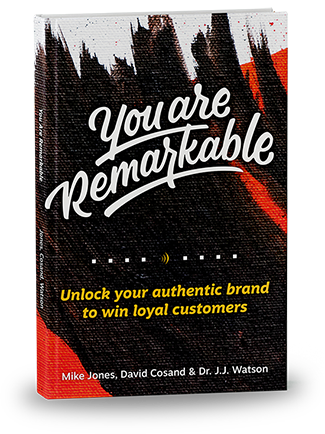People hate companies, but they like other people. Many companies focus on competence or low price, but people want to do business with other people. Still, with all of the work it takes to come across as human, if you can’t do it consistently, people smell a fraud. Isn’t it better just to stay a commodity brand, focus on the numbers? Let’s talk about that, and then go through a few common objections and find out if it’s really worth it.
Growth brings challenges. One of those challenges has to do with the ability to accurately and properly express themselves and their character. So what happens when someone sees a need and starts looking in the direction of your industry? When they find a list of companies offering a similar product or service which might meet their needs, can you give them a reason to choose you despite the price parity? Because in the end, the price is never the real reason people buy.
Sometimes it helps to bring a principle to its ridiculous extreme to find out if it still stands up. So let’s try a thought experiment. Have you ever gone to the store to buy beer, but ended up buying paper towels because they were cheaper? If you think this is as ridiculous as I do, then you realize that if at some point, the products are different enough, they don’t even compare.
Let’s try another one. Few people who need to get their taxes done choose a no-name person they’ve never met or heard of to do their taxes over someone who they know and has some kind of personality, simply because that other person is a little cheaper. There would have to be a big price difference. That’s because you’re also buying trust. And like the paper towels, they just don’t have what you’re looking for. Trust is an essential part of the product or service that you’re buying if there’s any appreciable risk.
But here’s the thing: By showing your personality, you’re taking a risk. People by nature understand this. Some people will actually think that your personality shows them that you’re so different from the rest that you’re the only one they want to work with. Simply because your personality projects the kinds of things they what. Once this happens, it’s very unlikely that they are going to choose your competition just because their prices are slightly lower.
Why? Because if we know someone, we feel we know what to expect from them. That’s why betrayal is such a surprise. We are not used to people appearing one way and then acting another. How do we tell? Well, if someone seems like they’re hiding something and they don’t want to answer questions, it hurts your trust for them. It could even be for a very legit reason. For instance, maybe they have a legal department that doesn’t want them talking about certain things. Maybe their organization is very secretive. But the people on the outside, like you and me, may not understand this. We may see your secretiveness as being shady. We may think that you don’t want to share things because you might be found out.
This is why personality matters. If you’re able to consistently show who you are, people will be much more likely to choose you. This can be a huge advantage. And much of it comes down to knowing who you are and then being able to share that with your employees and anybody who creates communication for you so that they can show the rest of the world. It starts on the inside. So let’s talk about the three objections people use to downplay the power of a brand’s personality.
“It’s All about the Numbers.”
This objection really comes down to a lack of faith in a brand. Some people think that customers make choices logically. But Daniel Kahnemann and Amos Tversky, back in the ‘70’s, did a lot to disprove this theory. But the myth of rationality persists, convincing some marketers that people are rational actors, who don’t consider a product or service’s brand, but only consider the price. And yet, we often make gut-level decisions about products because of reasons we can’t quite articulate. Afterward, we are willing to post-rationalize our decision to reinforce our own narrative about our own perceived objectivity.
And it’s not any different in business-to-business relationships. When people make business decisions, they’re hiring someone who will make them look good and will perform in a way that’s expected, without creating problems. They want good results, not just the cheapest price. They want zero headaches. And a price doesn’t tell you how many headaches you’re going to have with them. In fact, a low price might indicate the opposite, depending on their experience.
People who think this way sometimes have a “test-don’t-lead” mentality. This means that they would rather create communication based on what the market is doing, making product claims, and then see what works. This is kind of like the throw-spaghetti-at-the-wall-and-see-what-sticks mentality. We’re not against testing; we just don’t think it’s a strong principle if your goal is to lead a brand into the future.
In truth, it’s not about the numbers. Your personality is part of the package that summarizes many of those intangibles that make all the difference in your business relationships. It shows them all the things about their relationship that they can’t tell from the price or the product description.
- Are you going to be on time?
- Are you reliable?
- Are you organized?
- Are you going to be flexible with me if I’m in a pinch?
These things matter to people, and a contract or statement of work will never tell you these things. Only personality starts to show them that. It’s the best indicator — the only indicator — of these very important things at the beginning of a relationship.
“We Don’t Want to Alienate Clients”
This second objection comes from people who don’t really want to choose…at least, not yet. And In fairness, maybe they don’t really know they need to choose. This is one of the cardinal mistakes businesses make, and it’s akin to not being able to choose an audience.
Think about that for a second. You can’t choose your audience. Maybe you think “everyone” is your audience. But the problem is, you can’t buy advertising (media) based on everybody being your audience. How will you choose who to talk to or who to target in advertising? In the end, you have to choose and concentrate your efforts. It doesn’t mean you can’t have more than one audience segment, but there must be segments. Because it’s highly unstrategic, given limited resources, to fail to choose an audience. You have to be willing to put yourself out there and make the bold claim. “Here’s what we are best at.”
Now do there need to be enough customers and clients who can buy? Of course. If not enough people see value in working with someone like you in an industry, then at the business level your idea is flawed. But most of us don’t have this problem. Most businesses focus too broadly, not too narrowly.
You may find in this case that a good branding agency like Resound can help you decide how specifically you want to brand, based on your personal values and the market that’s out there. We can help you figure things like this out. If you’re interested, hit us up.
Your willingness to make this decision and take the stand, based on who you really are, goes along with one of our values: The world needs you as you are. It doesn’t mean you have to share every obscure belief that you personally hold in your branding. It just means that anything that’s related to what you do in the value you bring to the market should be considered.
“We Tried it Before, and It Didn’t Work.”
This objection is probably the easiest to overcome for brands who are serious about getting bigger and mattering to the market. To claim that a brand has tried this without success, they would have had to do the following:
- They created a personality that’s authentic.
- They shared that with their company.
- Those personality traits were based upon their values, building an image of consistency.
- And because it’s based on who they are, it would have had to have been easy for that brand to live out every day and in all its communications.
- It was a winsome set of brand personality traits.
If they did all that and it didn’t make a difference, I’d be a little surprised.
The only place this could really be true is in industries where your character literally doesn’t matter. Where accountability is 100% (it’s impossible to hide low quality or delays). Basically, we’re talking about a commodity market. But even in this case, there needs to be some level of trust placed in the company.
Think of a gas station. You want to believe that they’re not watering down their gasoline with some other additive that’s cheaper for them so they can make more money, while they risk damaging your engine. The only way you know this is if it’s a national chain because someone probably would have figured it out and blown the whistle by now. Plus, it’s very expensive for a big, national brand to screw up like that. The other way you might know is if you know the owner, and know that he would never do something unethical like that.
So I would ask the following questions to somebody who had this objection. First of all, are you in a commodity market? A gas station might have limited use for a strong brand and strong personality traits. And even then, maybe the future will bring us a gas station that has great messaging, great personality, and helpful staff that go out of their way to help you out, backed up by processes that support this? Remember, not all industries started out with as much margin as they have today. Before Nike came along, running shoes were much more commoditized than they are today.
The next question I’d ask is “What were you expecting it to do?” Did they finish the job, carrying the rebrand through to its conclusion? Did they do only part of the work, expecting the brand to start working?
How authentic and well-defined were your brand values leading up to this? Did we skip the brand values and research sections of this process? Because that may have yielded brand values that are completely inauthentic. But since they didn’t expose them to light, nobody could really provide accountability.
You’ve Got a Great Personality
Okay, so those are the objections. If you still think they’re valid, I’d like to hear from you. Because at Resound, we believe every brand is remarkable. Every company, even accounting firms, have personalities that can and should come out, not to distract from what you offer, but to show people you’re human. You have the opportunity to let it show.
While other companies focus on competence or low price, let your personality show and be the kind of company other people just want to do business with. For help, check out our brand personality worksheet and let us help you discover the traits that make you genuine.



